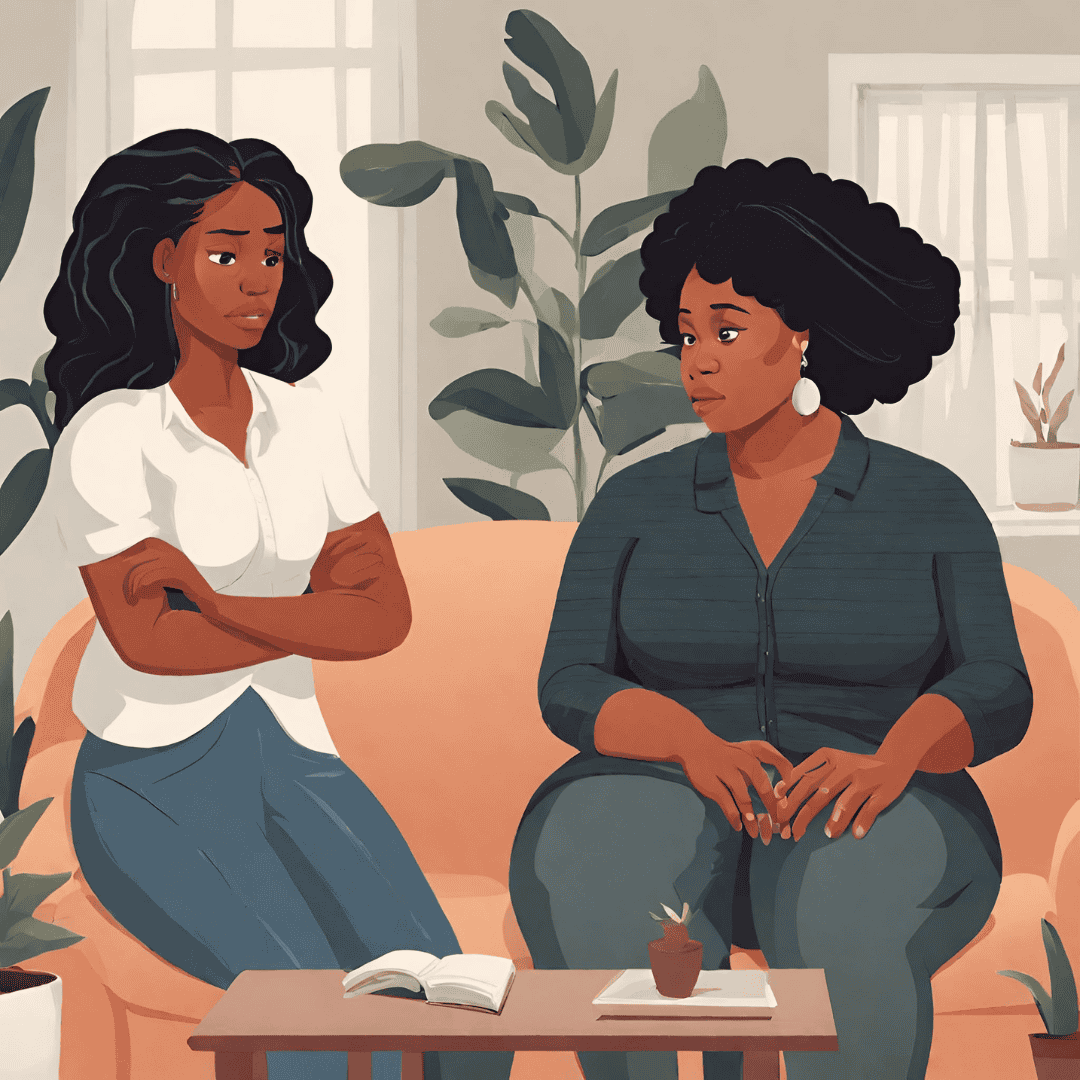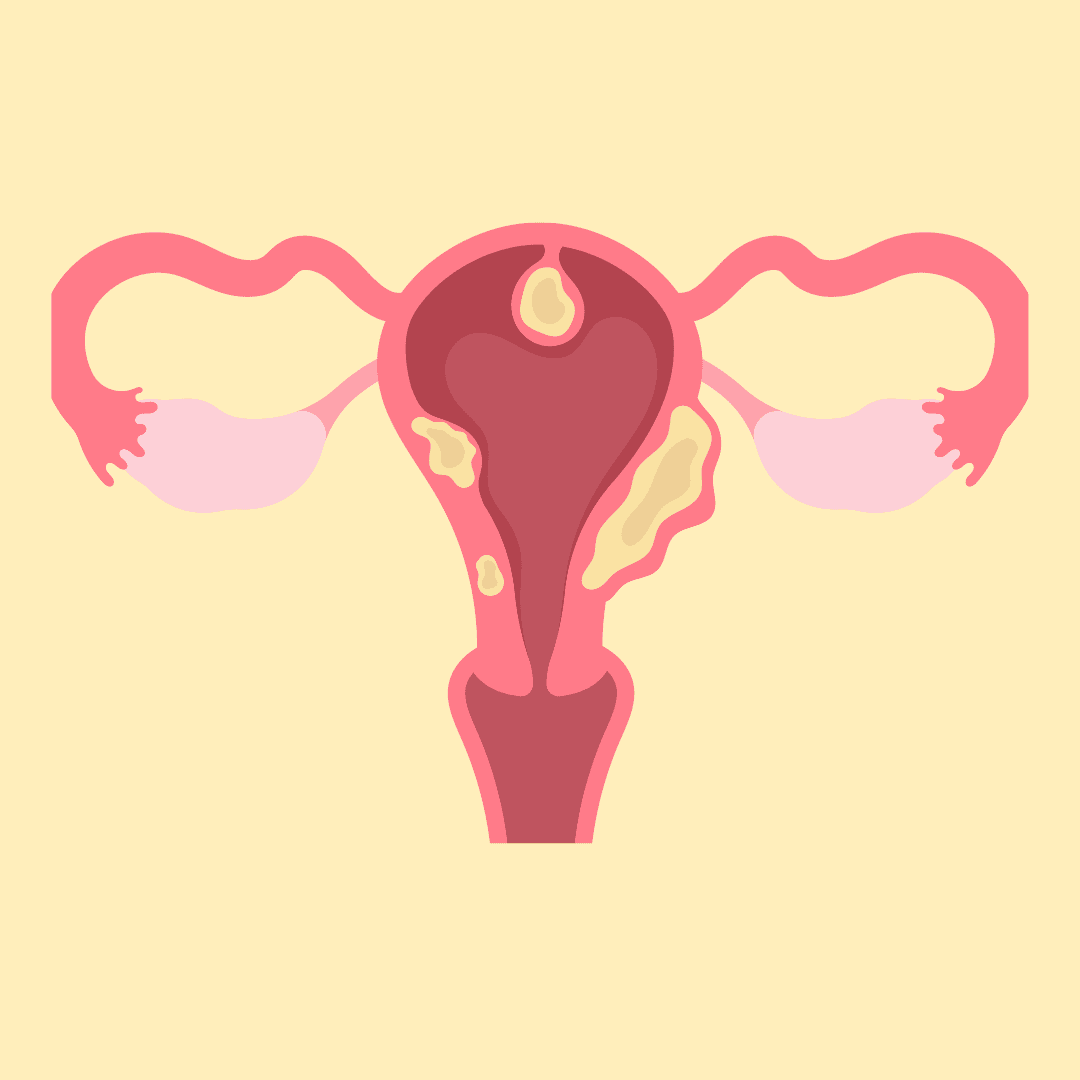-
How Toxic Black Mother And Daughter Relationships Affect Black Daughters
Disclaimer: In this lifestyle blog, this article contains the blogger’s opinions and is written for educational purposes. The information that has been written is accurate to the best of my knowledge and may include some errors and omissions.
I am not a psychologist or another type of mental health professional. I reserve the right to change how this blog is being managed and the focus of this blog may change at any time. Read at your own risk.
What is emotional abuse?
Emotional abuse is a pattern of damaging behaviour that reduces self-esteem and self-confidence in children and adults. Bustle defined emotional abuse as including behaviours related to verbal abuse such as “belittling, shaming, demeaning, name-calling, teasing, silent treatment, yelling and ignoring a child.”
Also, the Mind Body Green blog stated that this type of psychological abuse affects the self-worth of children and ignores their experiences and feelings. Emotional abuse is using emotions to control children which attacks their mental health.
The Insider indicated that “the parental emotional abuse can leave wounds on the adult.” The study shows that 36% of adults experienced emotional abuse during childhood and added that most perpetrators of emotional abuse are 53.7% women and 45.3% men.
This is interesting because the statistics show that some women tend to be more emotionally abusive to their children. It doesn’t mention the racial groups, the ethnicities and the socioeconomic groups of the participants.
Based on BetterUp, childhood trauma is when “a child is exposed to a traumatic event or experience a traumatic behaviour.” An example of witnessing a traumatic event can be domestic violence between their parents and another example of experiencing trauma can be sexual, physical or emotional abuse.
This article explores emotionally abusive African mothers and the relationships between toxic black mothers and daughters.
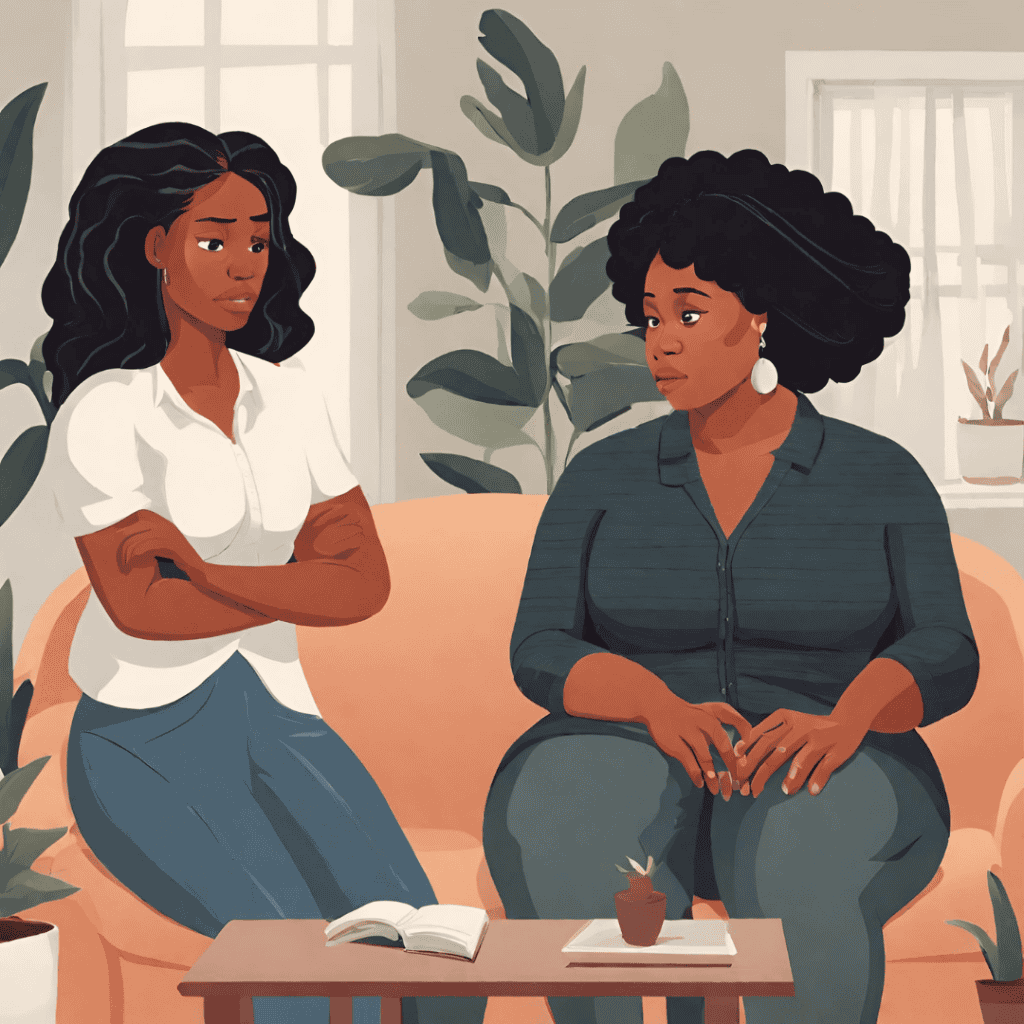
An illustration generated by AI on Canva of a black daughter and black mother sitting on the couch. Her daughter has her arms crossed. Why are some black mothers emotionally abusive?
Research by Live, Love and Bloom explored the reasons why a toxic mother would display toxic behaviour that is damaging to her children and why she would emotionally and verbally abuse her children with no remorse.
Here are a few reasons:
- Childhood trauma– the article suggested that mothers may have experienced childhood trauma when they were younger. This would make sense especially if some mothers were exposed to traumatic events such as physical or emotional abuse that has affected them in adults and haven’t healed from the trauma.
- Poor relationship with a maternal figure– if a black woman had a poor relationship with their mothers or stepmother or another family member. This may show that they haven’t been able to develop a close relationship with the maternal figure, and this has led to the mother not having a close relationship with her children especially if she only has daughters.
- Mental health conditions– If someone has mental health conditions such as depression and anxiety, this can be linked to upbringing, the culture they grew up in and how they dealt with mental health issues.
- It’s common knowledge that there is a stigma in the black community when it comes to talking about mental health. Even though we are seeing more of the younger generation of black women who are accessing and going to therapy, the stigma is still there.
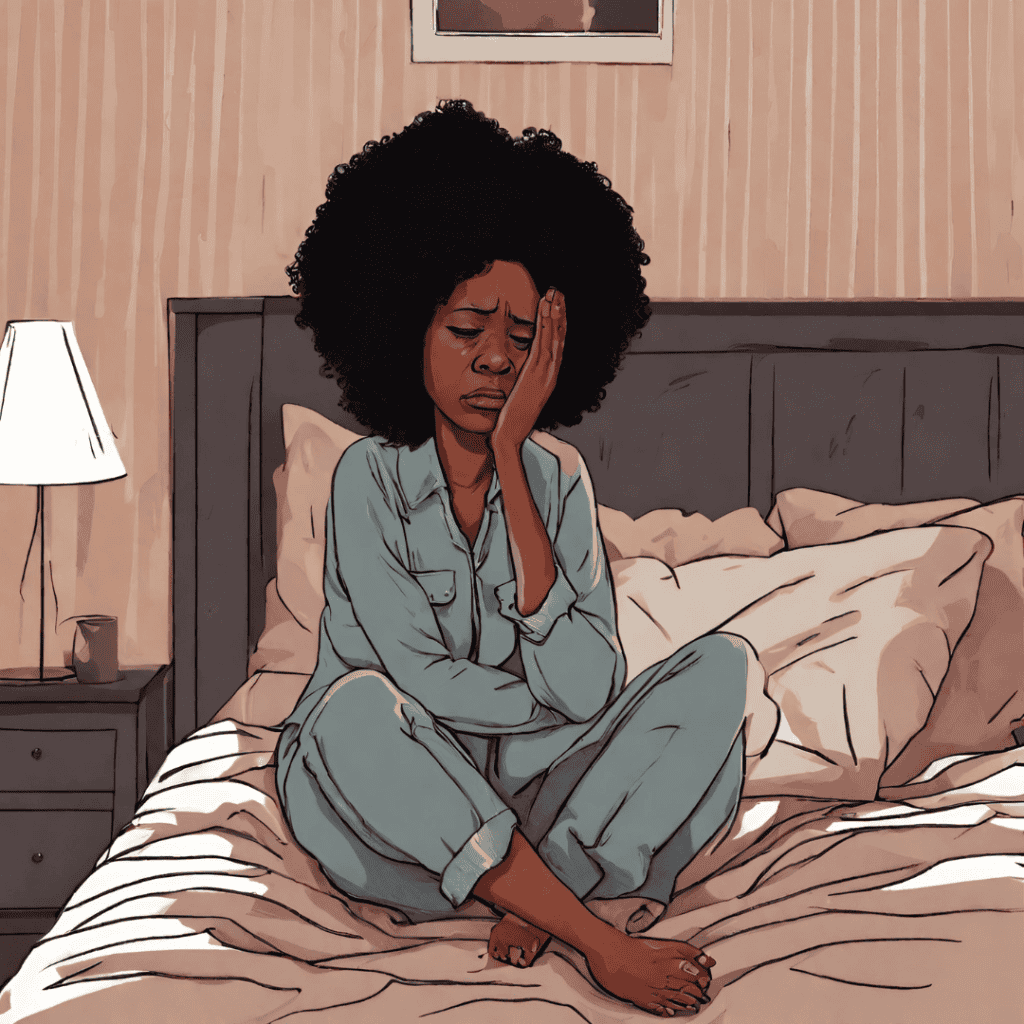
An illustration generated by AI on Canva of a black woman with an Afro wearing grey-blue-ish pyjamas looking upset. On the other hand, Bethany Webster uses the concept of the inner child to explain why some mothers emotionally abuse their children.
She explained that a lot of the abuse that her adult children experienced has to do with their mother’s inner child who hasn’t healed from the childhood trauma. They have an inner child who didn’t receive the same love and affection from their parents.
When black toxic mothers do not nurture their relationships with their daughters, the daughters may resent the toxic African mothers because they have not prioritised the time or made an effort to build a relationship with their children.
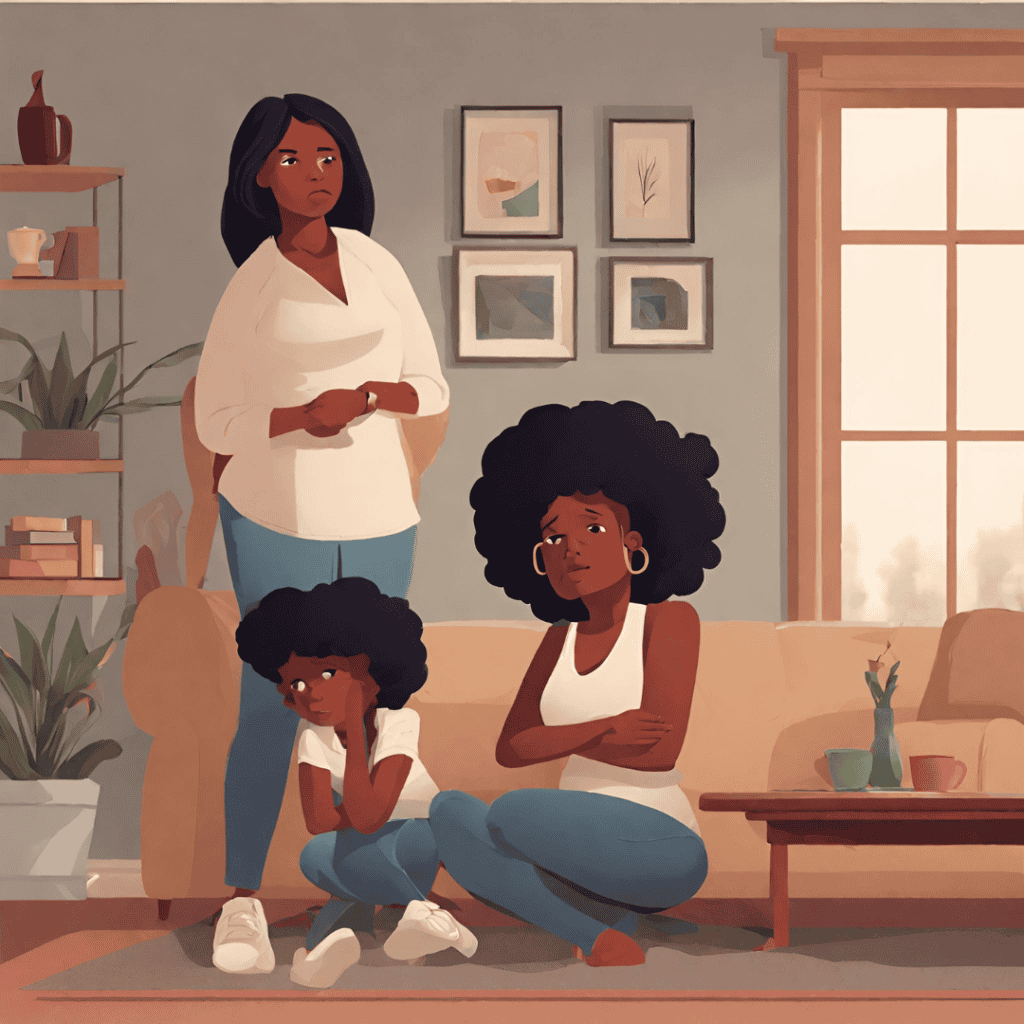
An illustration generated by Canva on AI of a black mother and her 2 daughters with her eldest daughter crossing her arms and her youngest child with her hand on her face. What are the signs of emotional abuse?
Your parents lack showing affection– if your parents never expressed affection to you when you were a child, this is because affection was probably never shown to them and it wasn’t the norm. Affection is a normal feeling towards another person, but when their children witness affection between their parents, it can seem strange because they were never shown.
Storytime
If you’re like me and you were raised by toxic parents where affection and showing emotions is never a regular experience, it becomes harder to express yourself because you live in an environment where showing affection was not displayed by your parents.
I remember when I was a teenager and I was at the dinner table in the living room, eating and talking to my older sister. My mother was staring at herself in the mirror and my dad was sitting on the couch watching TV.
And for a brief moment, me and my sister saw a bit of affection my Dad lifted his hand and my mum put her hand into his hand instead of smiling and saying aww- the romantic gesture shook us to the core.
Honestly, we were looking at each other in disbelief and it was awkward because when you have parents that don’t hug themselves or their children, the last thing you would expect is holding hands.
Why? Because our very traditional, African parents who are from the baby boomer generation never hugged each other or held hands.
Lack of apologies– it’s very difficult when your mother doesn’t apologise often because you are not used to them apologising for their actions.
Lack of praise– if you have done well in school, you might get some praise. Other than that, a mother praising her children isn’t something that is done on a regular basis.
Emotional manipulation– this is when the “perpetrator controls the victim emotionally which gives them an advantage over the victim.” This is a type of emotional abuse that has a range of tactics that can be used to control someone’s emotions.
Guiltripping– this is another manipulation tactic where the perpetrator manipulates the victim by making them feel guilty or bad about their decision. The aim is to make them feel guilty so that they can control how they think, feel and act about a decision and when guilttripping happens often- it can turn toxic.
Silent Treatment– This is another form of emotional manipulation where the mother can give her child silent treatment especially if her child has done something that didn’t make her happy. Giving silent treatment is a harsh way to punish someone because you are not allowing the child or the adult to resolve the issue.
Cruel– Some mothers who are angry about something can project their emotions towards their children.
Hide your emotions– if you have parents who are emotionally detached and the environment didn’t create a safe space to have your voice heard then you are more likely to struggle with expressing your emotions.
Teasing– repeated humiliation and insults can affect the mindset of children and adults because they will feel less confident than their peers.
Comparison to siblings– your mother can compare you to other siblings or other girls around your age group asking you why you are not like them.
Gaslighting– this is another type of emotional abuse and manipulation tactic where the perpetrator seeks to confuse the victim by telling them that their experience is invalid or crazy. This can cause confusion that makes the victim question and doubt their reality.
Emotional Detachment/Abandonment– This is when the mother isn’t present in their child’s life as an adult emotionally. However, when it comes to emotions, the parents haven’t healed yet and do not express emotions healthily. This can lead to a barrier between the mother and her daughters because she hasn’t tried to connect with her children emotionally.
Threats of physical abuse– this is a common part of parenting by African mothers. Even though it’s a harmful way of raising her children, this tactic silences her children and doesn’t allow room for disagreement or expressing themselves. Even though it doesn’t happen, black children know the actions that come with suffering the consequences.
Verbal Abuse- when you have been called a bad child or a child that isn’t respectful towards her parents that can make the child feel sad. This can lead to internalising guilt because the child disappointed her parents. Another example is the name-calling and scolding when your African mother tells you that you are worthless as a child which can reduce your self-worth.

A black and white illustration generated by AI in Canva of a black woman sitting on the window sill staring outside the window. What are the effects of a toxic Mother and Daughter relationship?
The effects of emotional abuse can be hurtful especially when it involves psychological abuse.
As you get older your mind has been affected by emotional and verbal abuse which has affected how you behave in society as a black woman. This means that you have low self-confidence and low self-esteem and you don’t think you have self-worth.
We don’t often realise that a lot of the mental health conditions that some people have could be a result of abuse. When you have been abused whether it’s physical, emotional or domestic, it can change the way you see yourself mentally, physically and emotionally.
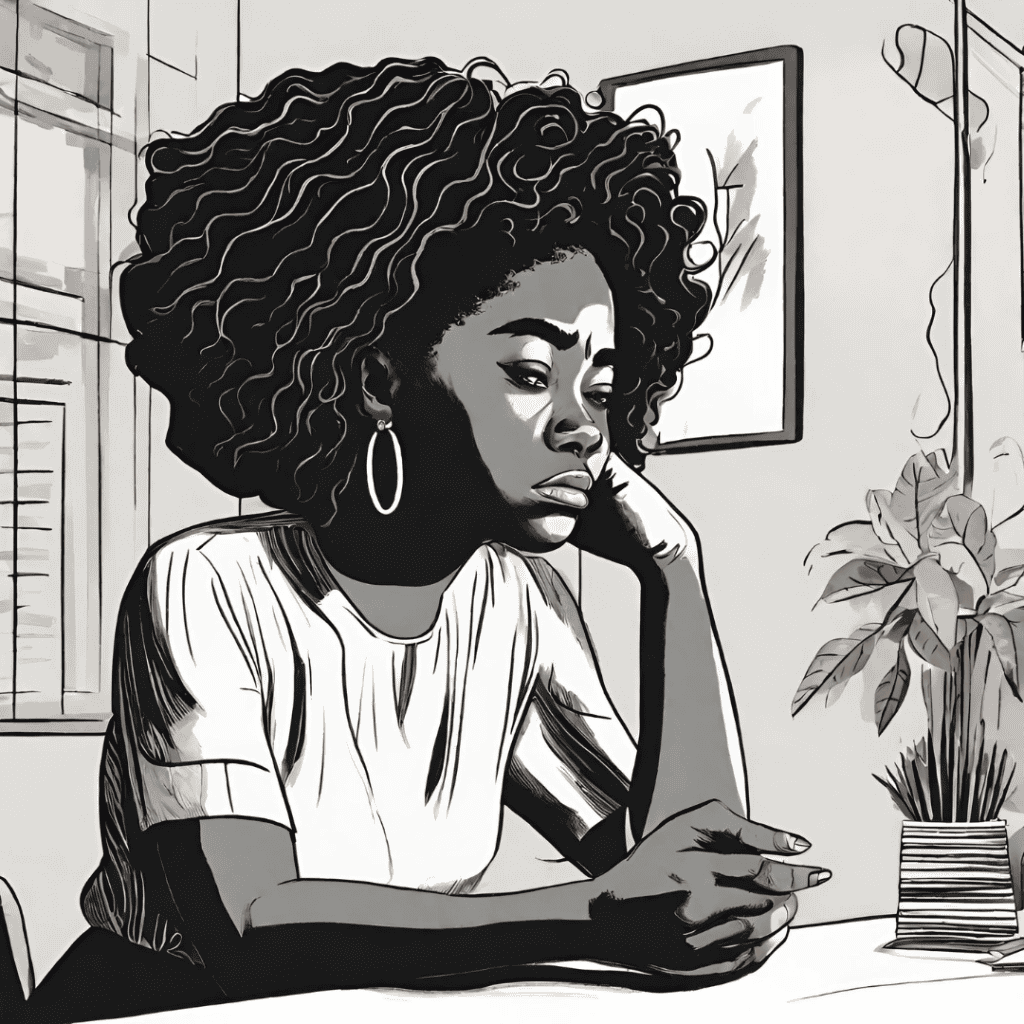
A black and white generated AI illustration from Canva of a young black woman sitting on her desk. Here are some of the effects of a toxic-mother daughter relationship that can develop into adulthood:
Low self-esteem and confidence
Low self-esteem and confidence can stem from criticism, verbal abuse and shaming. If your mother has called you names that hurt your feelings, then your self-esteem will be low and you are not going to believe that you are a confident woman.
Having low self-esteem can impact you especially when you are used to being criticised, shamed and constantly blamed by your parents. You are going to encounter dealing with the inner critic which is the inner negative voice in you that spreads negativity to your mind.
Anxiety
Anxiety plays an important role because African mothers who are toxic use fear to control their children and this makes them scared of their parents as a child which is unfortunate. Living with a mother who used fear to raise her children can cause worry and can lead to her daughter feeling anxious at a young age which can continue into adulthood.
Depression
Concerning Science Direct, the journal article explained that depression, anxiety and childhood trauma could affect the brain and how the brain responds to trauma and mental health conditions. They added that repetitive exposure to abuse can lead to children becoming more likely to develop mental health conditions such as depression.
Imposter syndrome
This is when you feel inadequate about your skills and experience and feel like a fraud. which is a direct consequence of living and growing up as a black woman navigating life in a toxic household.
Loneliness and Isolation
In addition, loneliness and isolation, if you grew up with siblings or as an only child being isolated from other family members in a different city.
Your support system would be your parents and this can feel lonely because you don’t have a strong relationship with your parents so you are less likely to tell them things going on in your life.
If there isn’t an older maternal figure that you can turn to, then you end up keeping it to yourself.
Final Thoughts
I hope this topic resonated with you as a black woman who was raised in a toxic environment. I hope that this can encourage you to start healing, for those who have not yet healed and those who have started to heal from their past wounds.
We know that many black women living in the African Diaspora will most likely have a story about toxic parents who were emotionally abusive. This is a good start to have these conversations online with other black women in your circle who can understand your experience.
This topic isn’t discussed openly in African households especially when it comes to toxic mother and daughter relationships. The generational trauma is passed down and it affects each generation, taking into account other factors such as the country your parents grew up in, the culture, how they were treated in their families, the misogyny and the household income.
A toxic Mother and Daughter relationship is upsetting because a daughter looks to her mum for advice, love and support and when they don’t receive it, it can unravel a whole lot of issues that lead to unhappiness.
I am not saying that every black mother is toxic but there are a lot of black women who have experienced toxic relationships with their mother as a result. There has to be more accountability, awareness, education and therapy to combat this parenting style.
Remember that you cannot change your toxic mother because change is her own decision and you need to make changes for yourself so that you are in a better space mentally, physically, emotionally and spiritually.
Thank you for reading the article, it is part of the black toxic parenting series. I hope you enjoyed reading it and learned something new and helped you realise that you can unpack, reflect and heal on your terms. Let me know what you think in the comments and don’t forget to clap and save this article.
Afro Lit Stories


Healing through storytelling, elevating black millenial women, one mindset shift at a time
